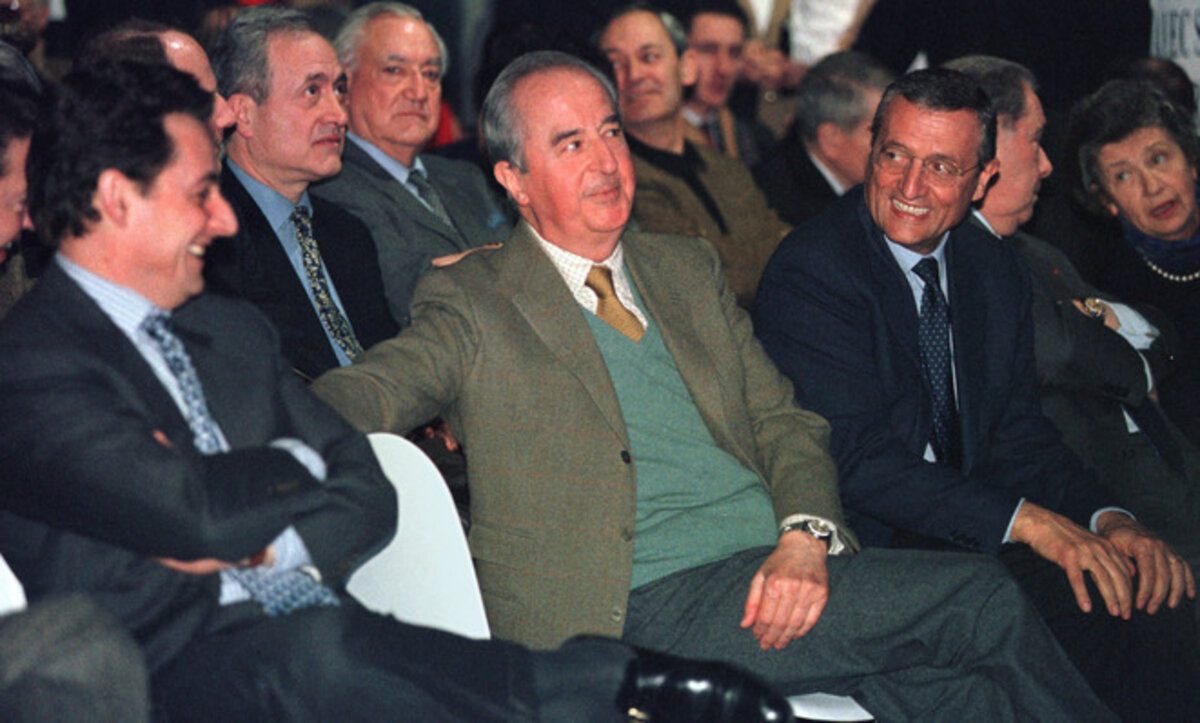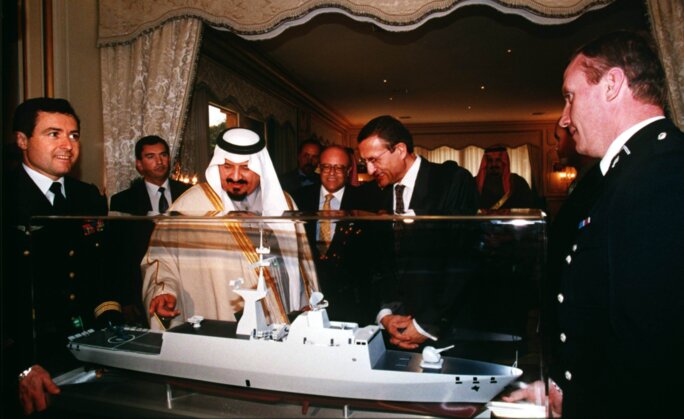The senior public prosecutor of France’s highest court has recommended that former French prime minister Édouard Balladur and the defence minister who served under him, François Léotard, should be sent for trial for siphoning payments from public defence contracts with Saudi Arabia and Pakistan in order to fund Balladur’s presidential election campaign.
François Molins, prosecutor-general of the cour de cassation, the supreme court of appeal, has advised that Balladur, now aged 90, and Léotard, 77, should be tried by a special court, the Court of Justice of the Republic (CJR), dedicated to investigating and trying wrongdoing by members of government while they were in office. His recommendation was signed off on July 12th but has only now been revealed.
The CJR opened an investigation in 2014 into the evidence against Balladur and Léotard in a complex case with vast political ramifications. Both men were placed under investigation for complicity in, and receiving the proceeds of, the misappropriation of public funds. The formal placing of a person under investigation in France is a legal status which requires that serious and/or concordant evidence has been found of their committal of a crime. Charges are brought at the end of the investigation, when they automatically result in a trial. The CJR must now decide whether to accept or reject the prosecutor’s advice.
The case centres on secret financial transactions in four weapons contracts signed in 1994, concerning the sale of three French Agosta submarines to Pakistan and three French Lafayette-class frigates to Saudi Arabia (the latter deal was dubbed Sawari II).
Balladur, who is regarded as the political mentor of former French president Nicolas Sarkozy, was French prime minister from 1993-1995, and in late 1994 announced he would run as a conservative rival to Jacques Chirac in the 1995 presidential elections. But Balladur did not have the financial backing of the Gaullist conservative RPR party, of which he was a member, whose candidate was Chirac.

Enlargement : Illustration 1

It is alleged that Balladur and his allies in government imposed, in the final stages of the separate weapons deals and despite the fact that the contracts were largely completed, a group of intermediaries – dubbed “Network K” – with the sole purpose of collecting commissions worth a total of 327 million euros (or around 2.14 billion French francs, the currency then in circulation).
The investigation into the events has found that a significant part of the sums handed to Network K, one of who was the French-Lebanese businessman and arms broker Ziad Takieddine, was in turn secretly brought back to France in cash to fund Balladur’s campaign in the elections, which were finally won by Chirac.
The investigation is into the financial crimes of what has become known as “the Karachi affair”, so-called after a suicide bomb attack in Karachi in May 2002 which killed 11 French naval engineers supervising the building in the port city of the submarines sold to Pakistan. It is suspected that the attack may have been in retribution for the non-payment of part of the commissions behind the deal, after Chirac had cancelled the outstanding payments of commissions immediately after taking office in a move aimed at cutting off further any funding of Balladur, whose political career subsequently came to an abrupt end.
The Karachi affair has been the subject of numerous investigations by Mediapart (see here, with links to related reports, and here).
The opening of an investigation by the CJR was prompted by the results of a separate judicial probe led by Judge Renaud Van Ruymbeke, who was required by law to hand it over to the CJR because it had established evidence of the personal involvement of members of government while in office, namely Balladur and Léotard. Others involved in the alleged scam, including ministerial aides and advisors, are due to stand trial before a regular court in October.
According to the 61-page document arguing the case for sending the two men for trial, prosecutor François Molins wrote that the investigation had found “sufficient” evidence against “the accused members of government”. Molins argued that Balladur, who had previously served as secretary general of the Élysée Palace under president Georges Pompidou, and as economy and finance minister from 1986 to 1988, “had been informed – in the broad sense, but in a sufficient manner – of the negotiations of the contracts”. It was possible to “deduce” from the results of the investigation, he wrote, that Balladur was “conscious of the exorbitant nature of the commissions which accompanies the contracts placed in question, and that he validated them or at least allowed them to be made”.
Balladur, added Molins, “had a certain knowledge of Newtork K”, whose members he had met at his official prime ministerial offices and also in Saudi Arabia. While underlining that Balladur is not suspected of personally benefitting from the secret sums, the prosecutor noted that “he may have, on the other hand, closed his eyes to initiatives taken by his collaborators” who played an active role in setting up Network K.
The investigation identified the payment made, in April 1995, into the accounts of the “Association for the financing of the Édouard Balladur campaign” (Aficeb) of 10 million francs (equivalent to just more than 1.5 million euros) in cash. Under questioning, Balladur had claimed that the sum came from the proceeds of the sale at his public campaign meetings of T-shirts and pins. That was unconvincing, observed Molins, adding: “This sum is necessarily of fraudulent origin.”
The investigation found the trail of cash withdrawals made by Ziad Takieddine from accounts in Switzerland which “perfectly corresponded” with the 10 million francs paid just a few days later into the Aficeb accounts. Molins said that while the cash withdrawals did not provide “irrefutable material proof” of the origins of the payment, the correlation represented “serious” evidence against the former prime minister.

Enlargement : Illustration 2

Regarding Balladur’s defence minister François Léotard, the public prosecutor noted that he had “a much more important role than that of Mr Balladur”, and in particular because of his personal relationship with Ziad Takieddine. Léotard knew that Network K “was perfectly of no use and was remunerated in an exorbitant manner”, wrote Molins. “It is difficult to believe that he was not informed of the amounts of the commissions paid to the network which he had himself contributed to introducing into the final negotiations of the contracts.”
There remains, however, a blind spot in the CJR investigation and which concerns the eventual role of Nicolas Sarkozy, who was budget minister under Balladur’s premiership and who served as campaign director and spokesman for Balladur’s bid in the 1995 presidential elections. Judge Van Ruymbeke concluded there were sufficient grounds for the CJR to question Sarkozy as an “assisted witness” in the case, which is a legal term designating someone implicated in a case (and who can be assisted by a lawyer who has access to the case file, but against whom there is insufficient serious and concording evidence for their formal placing under investigation). In the end, the CJR questioned Sarkozy as an ordinary witness to the case, lifting the suspicion over his role as cast by Van Ruymbeke.
But as Mediapart has previously revealed, documents impounded by the investigation showed that Sarkozy, when he was Balladur’s budget minister, had personally authorised in writing the payment of bungs to Network K in a contract for the overhaul of French frigates sold to Saudi Arabia in the 1980s (see more here and here).
The sums, paid in April 1995 shortly before the first round of the presidential elections, were transferred into offshore shell companies belonging to Abdulrahman el-Assir, the Lebanese- Spanish partner involved in raking in the commissions. The sums amounted to more than 12 million euros (around 80 million French francs). The impounded documents showed that Sarkozy had disregarded his own ministerial administration which in March 1995 warned of “erring” decisions.
A Luxembourg police report dated January 2010 detailed that Sarkozy had, when budget minister under Balladur, authorised the creation in the duchy of a shell company which was set up to handle the payment of commissions from the Agosta submarine contract with Pakistan.
One of Sarkozy’s closest aides, his longstanding friend Thierry Gaubert, 68, who served Sarkozy as an advisor when he was budget minister, is due to stand trial in Paris on October 7th accused of personally transporting, along with Ziad Takieddine, cash sums from the secret commission payments out of the arms deals.
Also standing trial with Gaubert for their part in the alleged scam are Nicolas Bazire, who served as Balladur’s chief-of-staff when the latter was prime minister, and Renaud Donnedieu de Vabres, who served as special advisor to then defence minister François Léotard. All three deny wrongdoing.
Bazir, 62, who after serving as a senior civil servant held various senior private sector managerial posts, including that of managing director of French luxury goods firm LVMH, is a close acquaintance of Sarkozy’s, and was best man at the latter’s marriage to Carla Bruni in 2008. Donnedieu de Vabres, 65, who was elected as a Member of Parliament from 1997 to 2002, served as French culture minister from 2004 to 2007.
-------------------------
- The French version of this report can be found here.
-------------------------
If you have information of public interest you would like to pass on to Mediapart for investigation you can contact us at this email address: enquete@mediapart.fr. If you wish to send us documents for our scrutiny via our highly secure platform please go to https://www.frenchleaks.fr/ which is presented in both English and French.
-------------------------
English version by Graham Tearse


